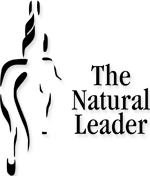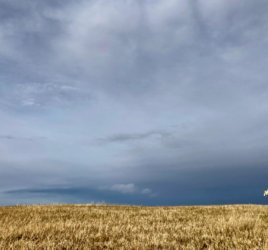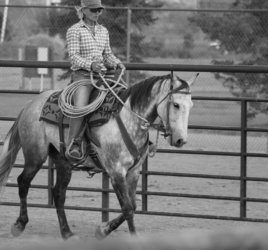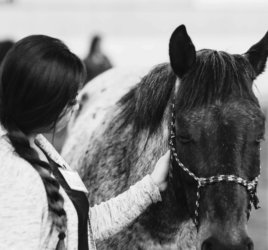If you are looking for someone to create an effective tax strategy or succession plan for your agriculture operation or small business. You might want to connect with Colette Miller, a partner with Wilde and Company Charter Professional Accounting and Director on the Board of ATBFinancial. My conversation with Colette began in her office and continued enroute to meeting with AVAC Ltd., a not for profit company she has been a Director with since 2010.
Our conversation was neither strategy or succession planning but rather how Colette’s relationship with horses has contributed to who she is today.
Colette appears to lead a full and busy life. Along with raising four kids, her partnership with Wilde & Company and the board positions she holds, Colette and Craig run a mixed grain and cattle operation outside of Vegreville, Alberta.
Growing up in small town Alberta Colette always rode recreationally. These days most of her time in the saddle is functional corral work or pasture checking. Sadly she laments, “I no longer have the time or focus to ride for just fun.”
NL – What have horses taught you about you about the basics of leadership? What skills you believe horses have enhanced or helped you with?
CM – Our conversation of a couple of years ago was the first time I’d ever considered a linkage between leadership training and horses. Before you posed that question I had never made the connection to work. It’s been a new thought process for me.
It goes back to the basics, first you need the right tools and skills for the job. You need the right horse for the job. The same way as a leader, you need to build a strong team around you with the right people and the right skills.
Second, both horses and people need to have been given the opportunity for their success.
What I have learned, which highlighted itself again yesterday. Is that it’s totally unfair to ignore my horse for a few weeks and then hop on his back and expect him to perform flawlessly for 2 hrs in a muddy corral among 250 cows and calves.
As a leader I would never do that to my people – put them in a position where they can’t succeed. I wouldn’t bring them in and expect them to perform when they haven’t been coached, when they haven’t been given the opportunity to learn a bit I like to bring them in early in the season so they can warm up.
And the third thing – patience. As a leader things don’t always go well, and we don’t always have the horse of our dreams. Exercising patience because getting angry will never help the situation, (like kicking your horse out of frustration). Learning to be patient and finding other ways to work through difficult situations, with the right attitude and maintaining your sense of decorum, to understand what ever is going on. Especially in situations where things are very charged and there is a lot going on, like in the corrals it’s very noisy and there is lots going on so you have to remain calm so the horse can do their job. If you don’t stay calm the horse will reflect that as well.
NL – how does that show up for you in the workplace?
CM – I guess I would say that I have more experience in the workplace. As a leader you have to provide clear instruction. The non-verbal is often just as important as the words, so being aware of the cues you are sending whether it is body language or a snort if you don’t agree.
Whether it is horses or people you still need to have the right people, but you also need to be ready to invest in them at the right time. Investing time and energy into them ensures both of your success.
NL – do you think you are a more patient person working with people as a result of your experience with the horses?
CM – I’m not sure what comes first but one reinforces the other. I’ve always been a patient person. I’m ambitious but I’ve always been pretty patient with people. I think by nature you have to be patient and you have to have a love and passion for working with animals in the first place. The more you do with that, the more it’s reinforced. You have to be able to stay calm especially in charged situations.
I find one of my weak spots would definitely fit with the old expression “I don’t suffer fools gladly” – I don’t see myself improving in that with animals either.
I’ve been trying to give my horse the benefit of the doubt and I’ve given him a lot of time but I don’t think he is the right horse for me. I am more aware of what I have been offering him, what’s coming first is it my patience or my expectations too much of him of where he is at.
The other day I finally switched horses. With my husband on him, he was a different guy. I commented afterwards about how unfair it is to get on the horse & expecting him to work, versus having a space to prepare us both to get ready to work.
NL – are you more aware of the non verbal in the workplace?
CM – Sometimes you learn the hard way, I think I am way more aware when things aren’t going well. Animals immediately give you huge cues when things aren’t going well, so I stop and do something different. Maybe that is something I’ve picked up intuitively from animals because I do the same with people. I read their cues as I don’t want people at their breaking point. So, yes, I believe that is something I picked up because of the animals.
I do know that everything you do reinforces the concepts and habits you have in life.
NL – Do you and Craig have different leadership/horsemanship style?
CM – We definitely have different leadership styles – I’m way calmer and tentative and more willing to cuddle my horse. My husband is very good with animals, he is more assertive and the animals sense it immediately. He communicates that very well with his animals, horses and border collies. He says: “They sense an underlying current that they don’t want to find out what is below.” We are very different energetically and our levels of temper.
Where I would tend to be tentative with horses, I am not at all tentative with people.
NL – What is the difference for you in being confident or being tentative with horses?
CM – the biggest underlying issue is the fear of getting injured. With my current horse we had a bit of a wreck, so there is that point that I don’t have full trust in him, I’m always a little bit guarded. Our history is a barrier.
Where as with people to a fault I will immediately trust them. I am also pretty good at sensing whether someone is a good energy person or not. I believe there are energies that show up in all of us and that I pick up instantly.
NL – when you say energy with people would you call it a gut feeling? How does that show up at work for you? Do you rely on that in hiring people?
Absolutely, I always trust my gut feeling, when you let your brain take over it’s invariably the wrong decision. I’m in a left brain industry, as an accountant my analytic kicks in and I’ll re-read a resume and I’ll go through everything in detail and will have done my due diligence. Still something won’t make sense. When I get that feeling I know that something is wrong. We hire very well as a result of that.
NL – If you can think of one thing that others could learn from working with horses what would it be?
CM – reminder of another world, our routes, where we came from. We are so inundated with technology and recognizing there is a world where things are done differently. There are still some jobs that horses are a better way to so something. Just yesterday two of those cows were pretty wild and you wouldn’t want to be on foot or on a quad. It helps us reframe the world in contrast to the high tech world we live in.
———
Our conversation covered a number of additional topics. After these first few questions, Colette exercised her due diligence and asked me a few tough ones. So it was a great full circle conversation about our programs, some of the people I’ve crossed paths with and challenges that we have met along the way.
Colette thank you so much for your time and sharing your thoughts and experiences.
Nancy Lowery has been blogging about her Leadership Learning through Horsemanship Experiences for over ten years. This series began as “One Foot in the Arena” to explore what other leaders in Calgary have learned about their own leadership through their relationships with horses.
To explore how a day with horses can complement your Leadership Training programs Nancy would love to hear from you.



